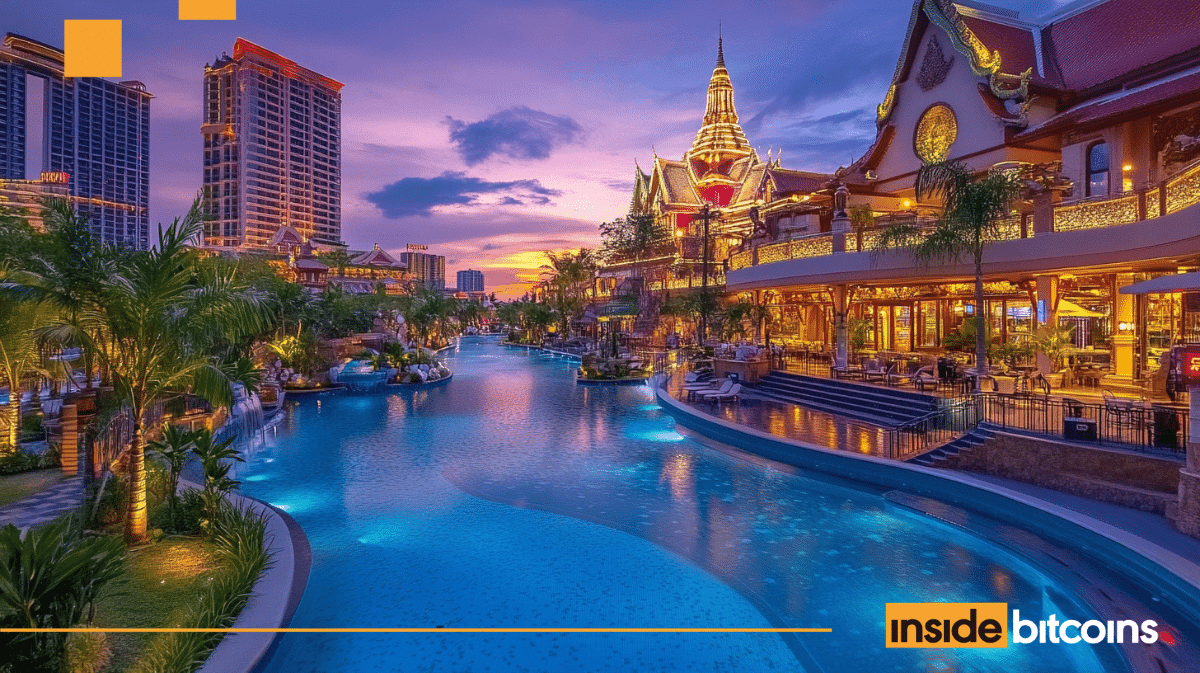Thailand stands at a gambling crossroads as the government advances plans for entertainment complexes with integrated casinos, triggering intense debate about economic benefits versus social costs. While proponents eye revenue growth and job creation, a significant concern has emerged—the potential decline in Chinese tourism, a crucial pillar of Thailand’s economy.
The Entertainment Complex Proposal
In January 2025, Thailand’s cabinet took a historic step by approving the Entertainment Complex Bill, marking a dramatic shift in the country’s traditionally conservative stance on gambling. This draft legislation, championed by Prime Minister Paetongtarn Shinawatra, aims to establish legal casinos within larger entertainment zones featuring hotels, shopping malls, amusement parks, and convention centers.
The bill represents Thailand’s most serious attempt to revolutionize its tourism industry through gambling legalization. Under the proposed framework, casinos would occupy less than 10% of each entertainment complex, with strict operational guidelines prohibiting online and crypto gambling outside casino premises. To address social concerns, Thai citizens would need to pay an entry fee of 5,000 baht (approximately $145) and prove they’re at least 20 years old to enter.
“Legalisation will protect the public and would also generate more state revenue,” Prime Minister Paetongtarn explained when announcing the cabinet’s approval. The legislation is expected to reach parliament soon, with implementation targeted for mid-2025 if approved.
Destination Selection and Development Plans
The government hasn’t been shy about its ambitious vision. Four provinces popular with tourists have been designated as initial locations for these entertainment complexes: Bangkok (receiving two licenses), Chonburi (Pattaya), Chiang Mai, and Phuket.
These weren’t random choices—they represent Thailand’s tourism crown jewels, strategically selected to maximize visitor appeal and compete with established casino destinations in the region like Singapore, Macau, and the Philippines.
Nikom Boonwiset, vice-chairman of the special committee overseeing the entertainment complex project, has emphasized that less than 10% of each complex would house gambling facilities. The massive 500-billion-baht ($14.9 billion) initiative aims to attract at least 50 million visitors annually and create upwards of 40,000 jobs.
Economic Dreams vs. Reality Checks
The financial allure of legalized gambling appears substantial on paper. Government forecasts suggest these entertainment complexes could boost foreign visitor numbers by 5-10% while increasing tourism revenue by 120-220 billion baht ($3.45-6.32 billion).
Beyond tourism dollars, the project promises 9,000-15,000 new jobs and significant investment opportunities for both domestic and international developers. Billionaire former premier Thaksin Shinawatra, the current prime minister’s father and influential figure in the ruling Pheu Thai Party, has long advocated for casino legalization as an economic catalyst.
The government backs these projections with survey data suggesting public support. A recent poll of 70,000 respondents reportedly showed majority approval for the new law, though critics question the survey’s methodology and representativeness.
Growing Opposition and Concerns
Despite potential economic benefits, the Entertainment Complex Bill faces substantial pushback from various quarters. The opposition People’s Party has criticized the government, pointing out that casino legalization wasn’t included in the Pheu Thai Party’s campaign platform.
The primary concerns revolve around social risks associated with legalised gambling, including an increase in problem gambling, organised crime, and corruption.
Religious groups and social conservatives argue the proposal conflicts with Thailand’s Buddhist values and cultural identity. Tip-apa Limvichai, partner at Thai law firm Chandler MHM, notes that “the primary concerns revolve around social risks associated with legalised gambling, including an increase in problem gambling, organised crime, and corruption”.
More pragmatic critics focus on Thailand’s regulatory readiness. Opposition lawmaker Rangsiman Rome, while conceptually supportive of casino legalization, believes Thailand lacks adequate legal frameworks and enforcement capabilities to manage the industry responsibly. He argues current systems are insufficient to protect society from money laundering and other criminal activities that often accompany gambling operations.
The China Factor: A Tourism Timebomb?
Another concern for Thailand’s tourism sector is how casino legalization might affect Chinese visitors—traditionally one of Thailand’s largest tourist demographics. During a recent parliamentary debate, MP Parit Wacharasindhu highlighted that Beijing has been actively discouraging its citizens from visiting gambling destinations abroad.
Parit revealed:
We learned during the prime minister’s official visit to China last month President Xi asked her three times about the casino policy. This should raise questions about whether this policy creates risks, as it might prompt the Chinese government to adjust policy, making travel to Thailand more difficult.
This concern gained substantial credibility when Chinese President Xi Jinping directly expressed reservations about Thailand’s gambling plans. During Prime Minister Paetongtarn’s China visit, Xi sought detailed information about the entertainment complex project and cautioned that legalizing casinos could lead to various social problems.
Sisdivachr Cheewarattanaporn, President of the Association of Thai Travel Agents, confirmed that discussions with Chinese counterparts consistently reveal unease regarding Thailand’s potential gambling expansion. He warned the Chinese government might restrict travel to Thailand if casinos are legalized, particularly given their association with money laundering activities.
Regulatory Challenges in a High-Risk Region
Thailand’s geographic position near established organized crime networks in Cambodia, Laos, and Myanmar creates unique regulatory challenges. The United Nations Office on Drugs and Crime (UNODC) has warned that Southeast Asian crime syndicates have transformed casinos and online betting operations into shadow banking networks that launder billions from illegal activities.
The Philippines’ experience with its Offshore Gaming Operator program offers a sobering case study. Launched in 2016 to license online gambling operators, the program was eventually shut down after becoming a hub for money laundering, cybercrime, and human trafficking.
Amanda Gore, director of the Center for Global Advancement, emphasizes that Thailand’s proximity to regional crime hubs makes it particularly vulnerable to exploitation. While the government acknowledges these risks, critics argue it hasn’t yet detailed specific preventive measures.
Experts recommend Thailand adopt international best practices like the UK’s gambling regulations while considering limitations on online gambling and cryptocurrency payments to reduce abuse opportunities. Benedikt Hofmann from UNODC suggests Thailand should thoroughly vet casino investors and players to mitigate potential criminal infiltration.
Historical Context and Regional Competition
Thailand’s relationship with gambling has always been complicated. Since the Gambling Act of 1935, most forms have been prohibited, with only state-run horse racing and lotteries permitted. However, this hasn’t prevented widespread illegal gambling throughout the country.
The current legalization push represents not just an economic strategy but an acknowledgment of reality—underground betting is already pervasive. By creating a regulated framework, the government hopes to address problems associated with illegal operations while capturing tax revenue currently lost to black markets or neighboring countries.
Thailand’s move comes amid increasing regional competition. Singapore’s integrated resorts transformed its tourism landscape after opening in 2010. The Philippines has developed Entertainment City in Manila, while Cambodia has seen significant casino investment in Sihanoukville and border regions.
However, Macau’s recent challenges demonstrate potential risks. During a December visit to the gambling hub, President Xi urged economic diversification beyond casino revenue—a directive that followed China’s crackdown on money laundering and efforts to limit Chinese citizens’ overseas gambling.
Implementation Realities
Beyond regulatory concerns, Thailand faces practical implementation challenges. Developing world-class entertainment complexes requires substantial infrastructure investment, environmental assessments, and coordination between private developers, local communities, and government agencies.
Thailand must also establish specialized regulatory bodies with gambling industry expertise—capacity it currently lacks. Critics question whether proper oversight can be developed quickly enough to manage the industry effectively.
Meanwhile, the debate continues to divide Thai society along political, religious, and pragmatic lines. As the government pushes forward with its ambitious timeline, the question remains: will Thailand’s casino gamble pay off, or will it jeopardize the country’s tourism sector and social fabric?
Related News
- Thailand’s Casino Legalization Receives Widespread Public Support
- Mastermind Behind $14 Billion Crypto Pyramid Scheme Extradited to China from Thailand
- Thailand Advances Toward Legal Casino Operations with New Draft Law Approval
- Thailand Launches Digital Asset Regulatory Sandbox for Crypto Service Testing


